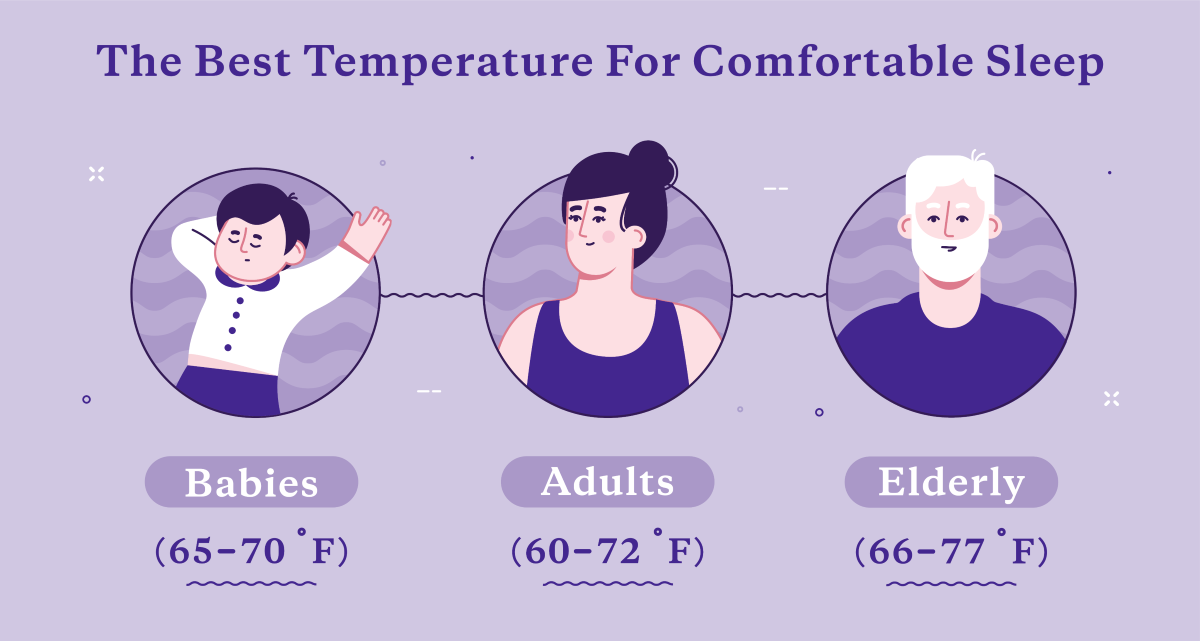Best Temperature for Sleep: Guide and Tips
What is the ideal temperature for sleep, and how do you achieve it? In general, the ideal sleeping temperature is somewhere between 66°F and 70°F. However, the exact temperature that is right for you will vary depending on factors such as your age and your personal preferences.
Studies show that at least 10% of all adults suffer from chronic insomnia and insomnia-related problems. One of the ways to treat insomnia is to create an optimal sleep environment. That means keeping the bedroom dark, quiet, peaceful, and cool.
In this article, we discuss why it’s important to maintain a cool bedroom and what you can do to achieve the optimal sleeping temperature — like choosing a cooling bed or opting for cooling sheets.. Read on to learn more.
For other sleep-related concerns, be sure to check out our guides on fixing your sleep schedule, getting more deep sleep, and learning how to sleep better. Remember, better quality sleep leads to a better quality of life!
The Best Temperature For Sleep By Age

Experts believe that bedroom temperature can greatly impact your sleep quality. So what is the best temperature for sleep? Studies show the best temperature for sleep ranges from 66.2°F (19 Celsius) to 69.8 F t (21 Celsius).
Bear in mind that people have varying core temperatures. So, there is no one optimal sleep temperature that works for every sleeper. Body temperature is also influenced by several factors, including gender and age.
Below we have outlined the recommended sleeping temperatures by age – does your personal preference fall within the recommended range for your age?
For Babies And Toddlers
The best sleeping temperature for babies and toddlers is between 65°F and 70°F. Young children may not be able to regulate their core body temperature as effectively as adults hence the slighter wider temperate range
For Teens And Adults
For a comfortable sleep, teens and adults should set their thermostats somewhere between 60°F and 67°F. It’s always wise to test a range of temperatures to find what keeps you sound asleep through the night.
For The Elderly
For older folks, the recommended sleeping temperature lies between 66°F and 70°F. Our core body temperature decreases as we get older which is why this range is slightly higher.
How Temperature Affects The Quality Of Your Sleep
Human bodies have internal thermostats that regulate their core temperature throughout the day. This thermostat is connected to your circadian rhythms (internal body clock) and your sleep cycle.
As your bedtime nears, your body temperature declines by about 2°F . Once in a deep sleep, your body continues to drop in temperature , reaching its lowest point around dawn then gradually rising as your body starts to wake up.
So, what does this all mean? The range of your ambient room temperature greatly impacts the quality, soundness and comfort of your sleep. If your sleeping environment is too hot or too cold, that feeling of well-rested rejuvenation may be compromised
Hot vs Cold: How Extreme Temperatures Impact Your Sleep
According to a sleep study in Japan, “excessively high or low ambient temperatures may affect sleep even in healthy humans without insomnia”, resulting in difficulties in accomplishing day-to-day tasks.
But how does sleeping in a too-hot room compare to sleeping in a freezing room? Continue on to learn more.
What Happens When Your Bedroom is Too Hot?
The same study found that heat exposure “increases wakefulness and decreases slow wave sleep and rapid eye movement”, which is further enhanced by higher levels of humidity..
Essentially, if your room is too hot and humid, it can impede your body’s ability to reach an ideal sleeping temperature, making it hard to stay asleep and get a healthy night’s rest. Instead, you may wake up feeling exhausted night after night.
Since your body temperature innately begins to cool as you near bedtime, a warm external environment can trigger a sense of wakefulness and energy as it assumes it’s time to wake up rather than sleep.
Another study found that sleeping in overly hot environments results in elevated levels of the stress hormone cortisol the next morning.
Further, one study compared people with documented sleep disorders who slept in a 61°F room versus a 75°F room. The colder sleepers not only slept better throughout the night, but they also woke feeling more refreshed and alert the next morning.
What happens When Your Bedroom is Too Cold
Cold exposure – particularly cold air exposure – is proven to cause sleep problems. People who sleep in the pathway of cool air tend to toss and turn more, experience an elevated heart rate, and wake up more often.
Additionally, your heart and blood vessels work overtime when temperatures are too low. According to one study, heart rates and blood pressure rates go up for sleepers in winter.
Tips For Maintaining The Best Sleep Temperature For You
How do you make sure you don’t overheat or overcool at night? Here are some top tips
Getting hot in your sleep? Live in a warmer climate? Check out our guide to keeping cool when it’s too hot to sleep or learn more about how cooling sheets work.
Is It Better To Sleep Hot Or Cold?
According to sleep experts, if you want to get quality sleep at night, it's best to keep the bedroom cool. The ideal temperature ranges are between 66 to 69° F for adults and 65 to 70° F for babies and the elderly, who may not have the best temperature regulation.
Sleep Soundly With Purple
Purple sheets are soft, stretchy, and breathable. Our cooling bed sheets are made of a bamboo-blend fabric that wicks moisture and keeps you cool all throughout the night.
